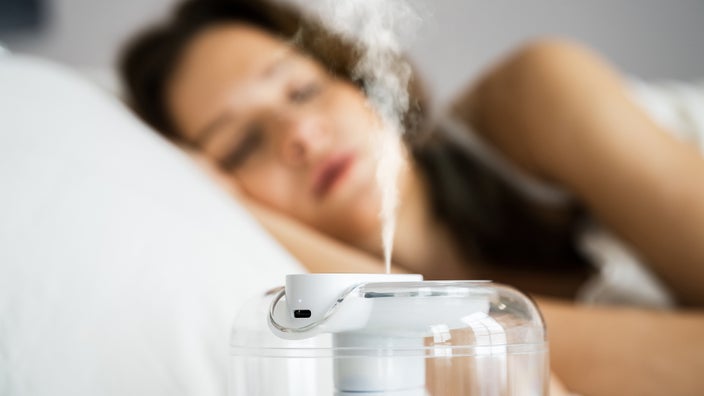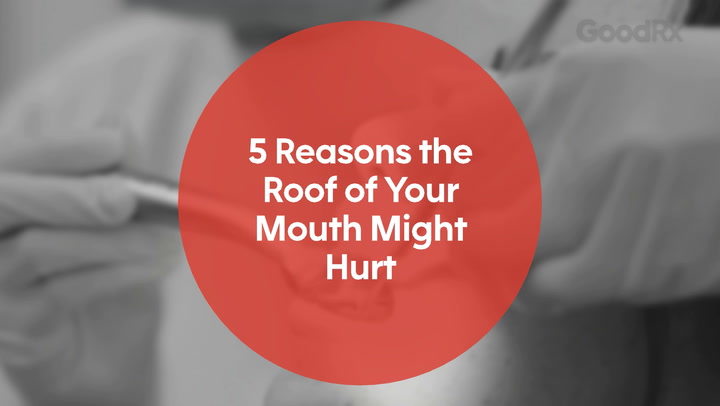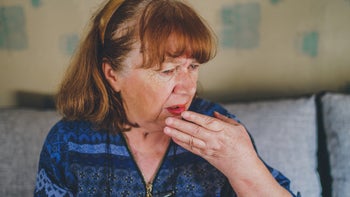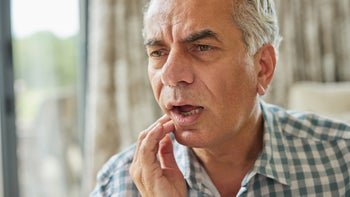
7 Ways to Prevent Dry Mouth While Sleeping
Key takeaways:
Dry mouth while sleeping can be a result of mouth breathing, medication, or an underlying health condition.
The best way to prevent dry mouth is to address the exact cause. But there are some ways to manage it in the meantime.
Staying hydrated, using a humidifier in your room at night, and avoiding substances like coffee, alcohol, and tobacco, are some things that can help.
Table of contents

Do you wake up with a dry mouth and sore throat every morning? Do you find yourself regularly reaching for a water bottle in the middle of the night, in a never-ending battle to quench your thirst? If so, it’s possible you’re dealing with nighttime dry mouth.
From simple lifestyle changes to the use of specialized products, there are many options available to help keep your mouth moist and comfortable throughout the night.
What does a dry mouth feel like?
A feeling of dryness is the most obvious sign of dry mouth (xerostomia), but this can occur hand in hand with other symptoms. Because your mouth is so dry, your tongue may stick to your cheeks, lips, or teeth. This can make it difficult to speak, swallow, and eat.
Other symptoms of dry mouth
If you have dry mouth, you may also experience a burning feeling on your tongue or a sore throat. Eventually, cracks may form at the corners of your mouth, and you may have other signs of irritation, like dry, red, or cracked lips.
Bad breath is another common sign of a dry mouth; that’s why many people wake up with “morning breath.” Saliva not only moistens your mouth but also helps wash away food particles that are left behind after you eat. If left in the mouth, these substances can contribute to bad breath. This can also increase your risk of tooth decay and cavities.
How to prevent dry mouth while sleeping
If an underlying medical condition is causing your dry mouth, you’ll likely need to get proper treatment for the condition in order to see lasting improvement. But here are seven steps you can take to prevent dry mouth in the meantime:
Stay hydrated. Drinking plenty of water throughout the day may help prevent dry mouth at night. It might also help prevent you from waking up at night out of thirst. While the recommended daily number of glasses varies from person to person, aim to drink half your weight in ounces of water a day. For example, someone who is 180 pounds should drink about 90 oz of water a day, which is around 11 glasses of water.
Use a humidifier. A humidifier can add moisture to the air, which can help keep your mouth moist while you sleep.
Keep your bedroom cool. A cool and well-ventilated bedroom can help you improve your sleep quality. While this is not directly linked to dry mouth, setting the thermostat at 60 to 67 degrees can help you get optimal sleep. This is important because dry mouth may make you wake up at night and interrupt your rest.
Use a specialized toothpaste or mouthwash. There are toothpastes and mouthwashes that are specifically designed for people with dry mouth. These toothpastes contain ingredients that can help moisturize the mouth and stimulate saliva production. And be sure to avoid alcohol-based mouthwash, which can make your mouth drier.
Watch what you eat and drink. Reducing your alcohol, caffeine, and tobacco intake may help prevent dry mouth. And avoiding sugary drinks and candy can help with bad breath and lower the likelihood of tooth decay.
Check in about your medications. If you think your medication is causing dry mouth, talk with a healthcare provider. They may be able to adjust your dose or recommend alternatives if necessary. But don’t stop taking your medication without talking with your provider first.
Seek regular dental care. Since dry mouth can impact dental hygiene, it’s important to have regular dental checkups to lower your risk of tooth infections and damage. Your dental care provider can also recommend treatments for dry mouth.
Home remedies for dry mouth
While preventing dry mouth is the ultimate goal, there are some home remedies you can try to help alleviate your discomfort immediately:
Give sugar-free gum or candy a try. Studies show that chewing gum or sucking on sugar-free candy can stimulate the production of saliva, which can help alleviate dry mouth.
Look into lozenges, gels, and sprays. There are a variety of products available to help stimulate saliva production, including sprays, gels, and lozenges.
Why do I get dry mouth while sleeping?
There are several reasons why you might experience dry mouth at night. Below is a look at some common factors.
Breathing through your mouth
Breathing through your mouth and snoring both dry up saliva, which keeps your mouth moist. It can also dry out your gums and the mucous membranes inside your mouth.
Mouth breathing can be caused by nasal blockages from:
Allergies or related symptoms
Sleep apnea
Swollen adenoids (glands in the nose)
Dehydration
When you’re dehydrated, your body may not produce enough saliva at night. This can cause dry mouth or make you feel like your saliva is extra thick.
Dry air can also dry out your mouth at night and make you feel dehydrated — especially if you’re also breathing through your mouth when you’re sleeping.
Medication side effects
There are a handful of medications and supplements that can cause dry mouth. Some of the most common are:
Antidepressants
Diuretics
Angiotensin-converting enzyme (ACE) inhibitors
Iron supplements
Chemotherapy and radiation
Underlying health conditions
Underlying health conditions may also play a role in dry mouth while sleeping. Some of the most common culprits include:
Diabetes
Sjögren’s syndrome
HIV/AIDS
High blood pressure
Hepatitis C
Other autoimmune conditions
Is having dry mouth at night a sign of a serious condition?
Dry mouth is not usually a sign of a serious condition. The most common cause of dry mouth is medication, which can be corrected by talking with a healthcare provider and managed with the above strategies. But it is possible for dry mouth to cause dental or gum problems.
When should you see a doctor if you have dry mouth at night?
If you still have dry mouth at night after trying preventative tips and home remedies, talk with a healthcare provider or dentist. They can help you find out what might be causing your dry mouth and come up with a treatment plan if needed.
The bottom line
Dry mouth while sleeping is fairly common, but it can be prevented or managed through hydration, saliva substitutes, and proper dental care. But if dry mouth persists or interferes with your quality of life, be sure to talk with a healthcare provider.
Why trust our experts?



References
Abreu, R. R., et al. (2008). Etiology, clinical manifestations and concurrent findings in mouth-breathing children. Journal de Pediatria.
Altamimi, M. A. (2014). Update knowledge of dry mouth - A guideline for dentists. African Health Sciences.
American Dental Association. (2021). Xerostomia (dry mouth).
Johns Hopkins Medicine. (n.d.). Dry mouth remedies: 14 to try.
MedlinePlus. (2017). Dry mouth.
National Institute of Dental and Craniofacial Research. (2022). Dry mouth.
Summer, J. (2022). Dry mouth at night: What causes it and how to prevent it. Sleep Foundation.
Talha, B., et al. (2022). Xerostomia. StatPearls.







